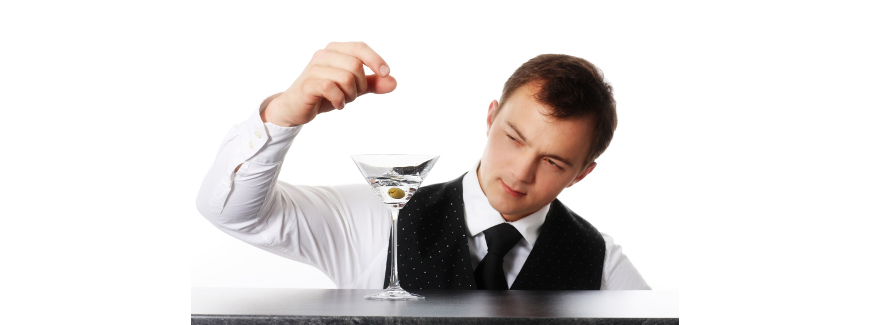Bartender Guide
This is our bartenders guide to answer some basic questions you may have about bartending. In addition to the bartending basics, you may browse through our bartender guide using our drink recipe categories, browse through drink names alphabetically, or browse by drink recipe ingredient. On our drink recipe pages you can also find similar drinks to the one you are looking at.
Enjoy!
Drink Recipes
| Browse through our Drink Recipies in Alphabetical Order. | |
| A List of the 25 most recent drinks added to our site. | |
| Most drink recipes fall into this general category. | |
| Here is our list of cocktails requiring a blender. | |
| For a little pick me up. Try these drinks containing coffee. | |
| Sweet tasty drinks you can't even tell have alcohol. | |
| Variations on the classic Martini. (shaken not stirred) | |
| If the drink you are looking for comes in a shot glass. | |
| Look out! These are some powerful drinks. | |
| Non-traditional, fun drinks to impress your friends with. |
The Basics of Pouring Drinks
When you are first starting out use a jigger to measure your pours. You should also make sure to use pour spouts. After a while you will get the feel of what the pour count (time it takes to pour a shot) should be for each kind of alcohol. The pour count will be different for a thick viscous liquid like Grand Marnier or Bailey's vs a thinner liquid like a vodka.
Referencing Drinks by Bar Cost
You will hear terms like well drinks and call drinks when around the bar. This is just a way of grouping drinks by their cost to the bar. This is also generally what the pricing of drinks is based on.
Well Drinks
Generally the cheapest mixed drinks and shots. The bar will have their standard low cost brands for things like vodka, gin, rum, tequila, bourbon. Usually the bartender will arrange their station so that the well alcohol is the easiest to access, since it will be used most often.
Call Drinks
A step up above well. Usually mid level cost items like Cuervo Gold and Jack Daniels.
Premium Drinks
Most of your best liquors fall in this category. Name brand vodkas, fancy scotches, good bourbons, etc. Blended drinks or layered drinks that take a lot of preparation are usually premium.
Super Premium / Top Shelf
The best of the best. Cognac and all of your most expensive liquor. Top Shelf got it's name from physical location. A Lot of bars would have their best stuff all the way on the top shelf of the bar, hence the name.
Glassware
Makes sure you have the proper glasses to serve your drinks in. In a busy bar you will be spending time helping your bar backs wash glasses when you start running out. On extremely busy nights consider moving to plastic glasses for serving. When it's really busy it's just too hard to keep all the glassware clean and ready to go. If you can though always use glass if possible. Most customers appreciate a drink out of a nice glass verses plastic.
Shot Glass
Generally 1 and 1/2 ounces in size. Used to serve shots and shooters.
Rocks Glass
Used to serve shots and shooters over ice.
Highball
This is a little bigger than a lowball. Usually drinks like long island iced teas are served in this glass.
Lowball
Most of your well mixed drinks will be served in this glass on ice.
Snifter
Cognac and brandy are served in this.
Flute
Champagne and Champagne mixes like mimosas are served in these.
Beer Mug
Can also be a pint glass.
Hurricane
Tropical drinks and blended drinks can be served in this.
Martini
Classic martini glasses are for what else? Martini's of course!
Wine Glass
For serving wine.
Margarita
Blended drinks like daiquiris and margaritas come in these.
Garnishes
The proper garnish makes for a great drink presentation. Make sure to have enough garnishes prepared ahead of time if you expect to be busy. Things like limes, lemons, and pineapple should be sliced up and ready to go. Standard drink garnishes are: lemon, lime, orange, maraschino cherries, olives, perl onions, and pineapple.
Tools of the Trade
Here is a list of the helpful tools of the trade for bartending. Bar supplies you will find useful and their descriptions.
Jigger
The jigger is the main measuring device of the bartender. Sometimes 2 sided with one side measuring a shot (1.5 ounces) and the other side measuring 1/2 of a shot.
Shaker
The shaker is used primarily for chilling shots, and mixing drink ingredients thoroughly. When you hear the term "shaken, not stirred" this is what you do that with.
Strainer
The bar strainer is used either with a shaker, or if in a pinch a glass like a beer pint. Used to chill and keep ice out of your pour. When you see the term "strain over ice", this is what you do that with.
Pour Spouts
Pour spouts are essential for the busy bartender. They help you regulate your flow from different bottles in a controlled manner. With a pour spout you don't have to guess at how much is in the bottle and how far to tip it before you get your liquid. With the spout you just turn the bottle over and the contents come out at the same rate every time.
Bar Mat
Catches any spillage so you do not make a mess.
Blender
Do not skimp here. A good blender will save you lots of time and aggravation.
Bar Games
Bar Games like darts (special drinking version shown in our bar supplies section) can add some fun.

